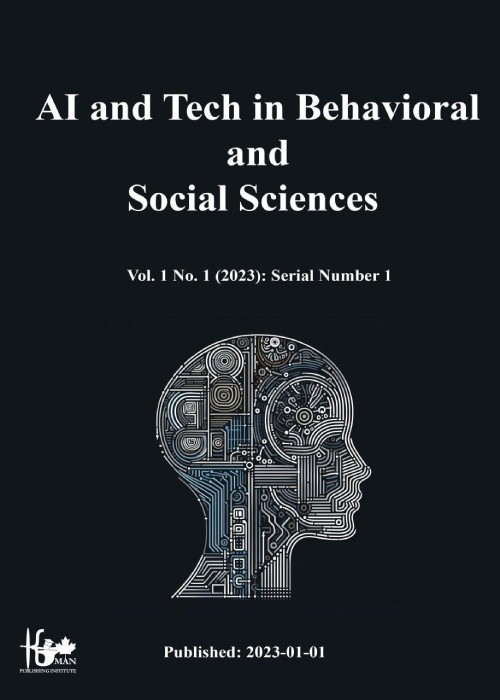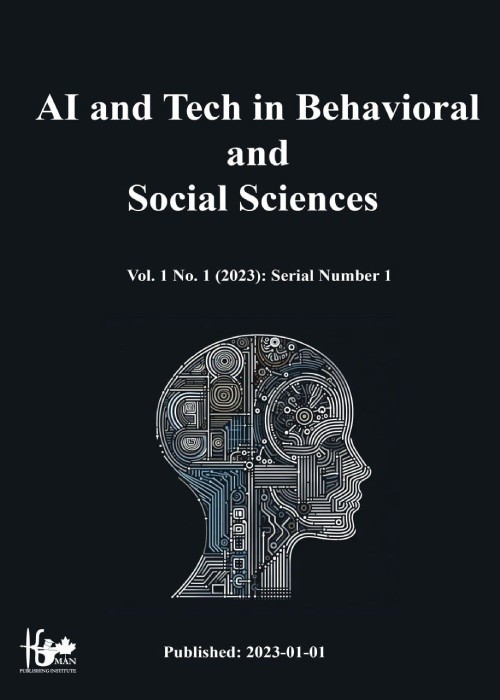فهرست مطالب

AI and Tech in Behavioral and Social Sciences
Volume:1 Issue: 3, Summer 2023
- تاریخ انتشار: 1402/07/01
- تعداد عناوین: 6
-
-
Pages 1-3
New advancements in artificial intelligence (AI) have positioned this transformative technology at the forefront of innovation, offering unprecedented opportunities to address some of the most pressing challenges of our time. Among these challenges, sustainability stands out as a critical area where AI can make a significant and meaningful impact. The literature emphasizes the imperative for a holistic approach to sustainable AI that encompasses environmental, social, and economic dimensions. This comprehensive perspective is crucial for maximizing the potential benefits of AI while minimizing any adverse impacts on the planet and society. Building public trust in AI through transparent, responsible practices is paramount for ensuring the long-term sustainability and ethical deployment of AI technologies. As we stand at the confluence of technological innovation and environmental stewardship, it is incumbent upon researchers, policymakers, and industry leaders to embrace the principles of sustainable AI. By doing so, we can harness the power of AI to not only drive economic growth and technological advancement but also to safeguard our planet for future generations. The time to act is now, and the path forward requires a concerted effort to integrate sustainability at the core of AI development and application. Through such endeavors, we can achieve a future where technology and nature coexist in harmony, paving the way for a sustainable, inclusive, and prosperous world for all.
Keywords: Artificial Intelligence, Sustainability, Environmental Considerations, Tech Advancements -
Pages 4-11
This study aims to explore the dynamics of online fandom communities, focusing on how these digital platforms influence engagement patterns, identity formation, community dynamics, motivations for participation, and the challenges and issues faced by members. It seeks to contribute to the existing literature by providing a comprehensive analysis of the multifaceted experiences of individuals within these communities. A qualitative research design was employed, utilizing semi-structured interviews with 33 participants actively involved in various online fandom communities. Thematic analysis was conducted to identify key themes and categories related to engagement, identity, and community dynamics. The study adhered to ethical guidelines, ensuring participant confidentiality and informed consent. The analysis revealed five main themes: Engagement Patterns, Identity Formation, Community Dynamics, Motivations for Participation, and Challenges and Issues. Engagement Patterns highlighted content creation, community interaction, and event participation. Identity Formation encompassed personal identity, group identity, and roles within the community. Community Dynamics focused on inclusion and exclusion, conflict and resolution, and support and solidarity. Motivations for Participation identified escapism, social connection, and skill development as key drivers. Challenges and Issues discussed toxic behaviors, identity safety, and content disputes. Online fandom communities play a significant role in shaping individuals' engagement patterns, identity formation, and community dynamics. These communities provide a supportive environment for creative expression, social interaction, and personal growth. However, challenges such as toxic behaviors and identity safety concerns highlight the need for effective community management and support mechanisms. The findings underscore the complexity of online fandom participation and its impact on individual and collective identity construction.
Keywords: Online Communities, Social Media, Identity Formation, Community Dynamics, Fandom, Digital Socialization, Engagement Patterns, Social Support, Cyberbullying -
Pages 12-18
This study aims to explore patient experiences with AI in healthcare settings, identifying their perceptions, concerns, and the perceived impact of AI on their care. The objective is to provide insights into patient attitudes towards AI, which can inform the development, implementation, and policy-making of AI technologies in healthcare. We conducted a qualitative study using semi-structured interviews with 26 participants who have interacted with AI-driven healthcare services. Participants were selected to represent a diverse range of ages, backgrounds, and experiences. Thematic analysis was employed to identify major themes and categories from the interview data, focusing on patient perceptions, experiences, and expectations of AI in healthcare. Five major themes emerged from the data: Understanding and Perceptions; Quality and Accessibility; Integration and Adaptation; Operational Challenges; and Patient Empowerment and Engagement. These themes encompassed various categories, including AI literacy, privacy concerns, care personalization, technical issues, and patient rights, among others. The findings highlight a general optimism about the potential of AI to improve healthcare outcomes, coupled with significant concerns about data privacy, ethical use, and the need for greater patient education and involvement in AI development. Patients perceive AI as a potentially transformative force in healthcare but underscore the importance of addressing ethical considerations, ensuring transparency, and enhancing patient engagement in the deployment of AI technologies. The study advocates for a patient-centered approach in the development and implementation of AI in healthcare to maximize its benefits while mitigating challenges.
Keywords: Artificial Intelligence, Patient Experience, Healthcare Quality, Patient-Centered Care, Ethics, Data Privacy, Technology Acceptance -
Pages 19-27
This study aims to explore user experiences with emotionally intelligent chatbots, focusing on their perceived empathy, satisfaction with interactions, and the impact on user perception. Additionally, it seeks to identify the main challenges and future expectations users have towards these AI systems. Employing a qualitative research design, this study collected data through semi-structured interviews with 28 participants who had interacted with emotionally intelligent chatbots in various contexts. Thematic analysis was conducted to identify main themes, categories, and concepts within the data, providing insights into users' perceptions and experiences. The analysis revealed eight main themes: Perceived Empathy, Interaction Satisfaction, Trust and Security, Human-Like Interaction, User Adaptation, Impact on User Perception, Barriers to Engagement, and Future Expectations. These themes encompass categories such as Emotional Understanding, Contextual Sensitivity, Engagement Level, Privacy Concerns, Learning Curve, AI Capabilities, Technological Limitations, and Improvement Suggestions. Participants valued chatbots' ability to understand and adapt to their emotional states but highlighted challenges in achieving authentic empathy and expressed concerns over privacy and data security. Emotionally intelligent chatbots hold promise for enhancing user experiences through artificial empathy. However, the authenticity of empathy, coupled with ethical considerations such as privacy and security, presents significant challenges. Future developments should focus on improving the genuineness of empathetic responses, ensuring ethical use of AI, and addressing users' concerns to fully realize the potential of emotionally intelligent chatbots.
Keywords: Artificial Intelligence, Chatbots, Emotion Recognition, User Experience, Privacy, Data Security -
Pages 28-34
This study aims to explore the experiences of freelancers with AI chatbots, identifying the main drivers behind their adoption, the challenges faced during their integration, and the overall impact on work and personal perceptions. Employing a qualitative research design, this study conducted semi-structured interviews with 29 freelancers from various professional backgrounds. Thematic analysis was utilized to distill the data into meaningful themes and categories, providing insights into freelancers' interactions with AI chatbots. Five main themes were identified: Adoption Drivers, Technological Challenges, Impact on Work, Ethical and Social Issues, and Personal Experiences and Reflections. Key findings include the efficiency gains and improved quality of work as primary adoption drivers, significant technological challenges related to integration and reliability, and varied impacts on job opportunities and financial aspects. Ethical concerns, notably regarding privacy, security, and bias, were prevalent. Personal reflections revealed a spectrum of perceptions on AI chatbots, from optimism about future prospects to concerns over professional identity and work-life balance. Freelancers' experiences with AI chatbots are marked by a complex interplay of benefits and challenges. While AI chatbots offer potential for efficiency and competitive advantage, their integration is hampered by technological hurdles and ethical dilemmas. Addressing these challenges, while fostering an environment that supports continuous learning and adaptation, is crucial for leveraging AI chatbots' full potential in freelancing.
Keywords: Artificial Intelligence, Chatbots, Freelancers, Technology Adoption, Ethical Considerations, Work Efficiency, Professional Development -
Pages 35-42
This study aimed to explore students' experiences with AI-assisted self-study, focusing on their engagement with AI tools, learning outcomes, perceived challenges and limitations, available support and resources, and overall perceptions of AI in education. Employing a qualitative research design, this study conducted semi-structured interviews with 20 students who have used AI tools for self-study. Participants were selected through purposive sampling to ensure a diverse representation across different academic disciplines, levels of study, and demographics. Thematic analysis was used to identify patterns and insights within the interview data. Five major themes were identified: Engagement with AI Tools, Learning Outcomes, Challenges and Limitations, Support and Resources, and Perceptions of AI in Education. Students reported positive impacts of AI on engagement and learning outcomes, including enhanced knowledge retention and skill development. However, technical issues, content limitations, and concerns about data privacy were highlighted as significant challenges. Support from AI in terms of tutoring and guidance was deemed beneficial, while perceptions of AI in education ranged from optimism about future possibilities to concerns about ethical implications. AI tools can significantly enhance self-study by providing personalized and interactive learning experiences that cater to individual student needs. While the potential benefits are substantial, addressing technical, ethical, and accessibility challenges is crucial for maximizing the positive impacts of AI in education. This study underscores the importance of ongoing dialogue and collaboration among educators, students, and technology developers to align AI tools with educational goals and ethical standards.
Keywords: Artificial Intelligence, Self-Directed Learning, Self-Study, Educational Technology, Student Perception, Academic Achievement


